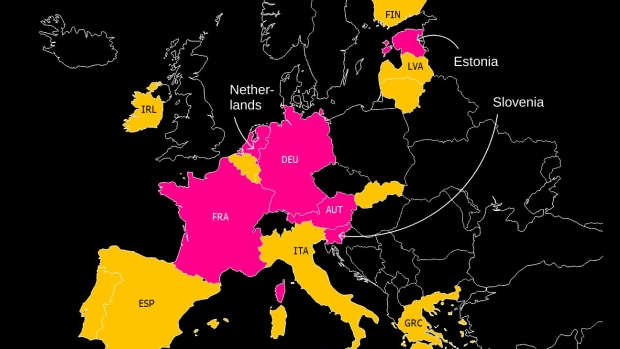Oct 10, 2019
ECB Meeting Account Shows Policy Makers Far Apart on Stimulus
, Bloomberg News

(Bloomberg) -- Explore what’s moving the global economy in the new season of the Stephanomics podcast. Subscribe via Pocket Cast or iTunes.
European Central Bank officials were far apart on many elements of the stimulus package last month that led to public acrimony over the decision.
The account of the Sept. 11-12 meeting showed some members of the Governing Council were ready to back an even deeper cut in interest rates in exchange for dropping the proposal to restart bond purchases. But there were also others who needed convincing about reducing rates at all because of concern about the possibility of increasingly adverse effects.
“A number of reservations were expressed about individual elements of the proposed policy package,” the ECB said in the account of the session. “Although the rational for a comprehensive package was widely shared, members assessed the case for specific elements differently, with some measures seen as substitutes rather than compliments, giving rise to trade-offs between elements of the package.”
The meeting was one of the most contentious in President Mario Draghi’s eight-year term, with about a third of the 25-member Governing Council opposing the decision to resume quantitative easing. The central-bank staff who prepare for the meeting had earlier recommended against QE.
The difference of opinion was extensive -- from the assessment of the economic outlook to effectiveness of particular tools and the scale of the action, the account showed.
“It was also cautioned that the Governing Council shouldn’t try to accommodate market expectations but should base its decisions on its own assessment,” the document said. “An argument was put forward that in an environment of high uncertainty, to exceed market expectations might be counterproductive, as this might be viewed as signaling a worse outlook than embraced in the forecasts.”
The ECB said that there was a “clear majority” in favor of restarting QE, though “a number of members” saw the case as “not sufficiently strong.” A remark was made that a decision that effectively makes bond-buying open-ended until inflation improves could lead to expectations for an increased pace of monthly buying that “would exhaust the purchasable universe and call into question the program limits.” The decision was made to put off the discussion about the constraints of the program until they “became more pressing.”
The cut in the deposit rate to a record-low minus 0.5% was passed by a “very large majority.” In the opening presentation, Executive Board member Benoit Coeure, who heads market operations, said investor “conviction about cuts significantly deeper into negative territory was not broad-based.”
After the meeting, Dutch governor Klaas Knot took the unprecedented step of announcing his dissent in a statement, describing the decision as disproportionate to the economic situation, and governors from Germany, Austria and France aired their grievances in interviews. Executive Board member Sabine Lautenschlaeger, who had also voiced her opposition to bond purchases, resigned without publicly giving an explanation.
Draghi responded by warning that discord could undermine the effectiveness of monetary policy. Bundesbank President Jens Weidmann, consistently one of the most vocal critics of QE, then used a speech last week to hit back at what he saw as an attempt to silence the stimulus debate.
The split has cast a pall over Draghi’s final weeks before his Oct. 31 departure, and put his successor, Christine Lagarde, under pressure to mend fences as the euro zone battles a worsening slowdown. Global trade tensions remained heightened, and the prospect of a no-deal Brexit -- possibly also on Oct. 31 -- has risen. Investor sentiment in the currency bloc fell to the lowest level in more than six years in October and a manufacturing recession in Germany, the biggest economy, is starting to hit demand.
In a rare sign of agreement at otherwise contentious meeting, all members agreed that there was an urgent need for governments with fiscal space to step in and boost spending “in an effective and timely manner,” the account showed.
To contact the reporter on this story: Piotr Skolimowski in Frankfurt at pskolimowski@bloomberg.net
To contact the editor responsible for this story: Paul Gordon at pgordon6@bloomberg.net
©2019 Bloomberg L.P.


